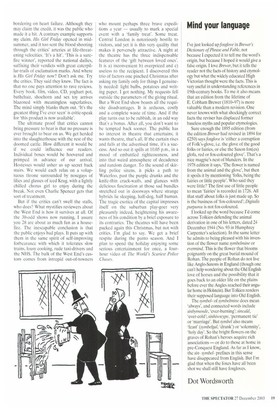Mind your language
I've just looked up foxglove in Brewer's Dictiontay of Phrase and Fable, not because I expected it to tell me the word's origin, but because I hoped it would give a false origin. I love Brewer, but it tells the reader not the facts of history and etymology but what the widely educated High Victorian thought were the facts. This is very useful in understanding references in 19th-century books. To me it also means that an edition from the lifetime of E. Cobham Brewer (1810-97) is more valuable than a modern revision. One never knows with what shockingly correct facts the reviser has displaced former baseless myths and popular etymologies.
Sure enough the 1895 edition (from the edition Brewer had revised in 1894 for £250) says foxglove is 'either a corruption of Folk's-glove, i.e. the glove of the good folks or fairies, or else the Saxon fox(es) glofa, red or fox-coloured glove'. That's a nice magpie's nest of blunders. In the 1978 edition it says, 'The flower is named from the animal and the glove', but then it spoils it by mentioning 'folks, being the fairies or little people'. Who said they were little? The first use of little people to mean 'fairies' is recorded in 1726. All that stuff about folks is just made up. So is the business of `fox-coloured'; Digitalis putpurea is not fox-coloured.
I looked up the word because I'd come across Tolkien defending the animal derivation in one of his letters, dated 24 December 1944 (No. 93 in Humphrey Carpenter's selection), In the same letter he admits to being pleased with his invention of the flower name symbelmine or evermind. This is the flower that blooms poignantly on the great burial mound of Rohan. The people of Rohan do not live like Anglo-Saxons in England (though one can't help wondering about the Old English love of horses and the possibility that it goes back to an older life on the plains before ever the Angles reached their angular home in Holstein). But Tolkien renders their supposed language into Old English.
The symbelof sy.mbelmine does mean 'always', and connected words include sinbyrnende, `ever-burning'; sincald, `ever-cold'; sinhiwscype, 'permanent tie' or 'marriage'. But symbel also means 'feast' (symbelgal, 'drunk') or 'solemnity', 'holy day'. So the bright flowers on the graves of Rohan's heroes acquire rich associations — or do to those at home in pre-Conquest England. As far as I know, the sinsymbelprefixes in this sense have disappeared from English. But I'm glad that when the foxes have all been shot we shall still have foxgloves.
Dot Wordsworth


























































 Previous page
Previous page